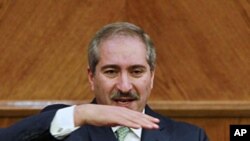Israeli and Palestinian peace negotiators have ended their first official meeting in 15 months without saying if they are prepared to resume the stalled Mideast peace process.
Israeli negotiator Yitzhak Molho and his Palestinian counterpart Saeb Erekat met Tuesday in the Jordanian capital Amman, initially in the presence of diplomats from Jordan and the Quartet of Middle East peace mediators. Molho and Erekat later held a three-way meeting with Jordanian Foreign Minister Nasser Judeh.
The Israeli and Palestinian governments made no statements after the talks. Judeh said efforts to renew negotiations will continue, but he did not give a time or date for the next meeting.
|
Mideast Peace Talks Since 2000 Israeli and Palestinian leaders are trying to renew peace talks. Here are some other attempts at talks since 2000:
|
Tuesday's talks represent the first known contact between Israeli and Palestinian negotiators since peace talks broke down in September 2010 over a dispute about Israeli settlement construction on occupied land. Ahead of the talks, Israeli and Palestinian officials said the meetings do not represent a formal resumption of negotiations, but could improve the atmosphere for future meetings.
U.N. Secretary-General Ban Ki-moon issued a statement welcoming the talks and urging the parties to "continue working to establish forward momentum toward a lasting peace."
Earlier Tuesday, Palestinian President Mahmoud Abbas reiterated his position that Israel must accept two demands before peace talks resume.
Mr. Abbas said Israel should stop all settlement construction in the West Bank and East Jerusalem - territories captured by Israel in a 1967 war. Mr. Abbas also called for Israel to accept its pre-1967 boundaries as the basis of a border with a future Palestinian state.
Israel has said new peace talks should not have preconditions. Mr. Abbas said his West Bank-based government is considering new strategies if peace talks do not resume by January 26. He described the potential measures as difficult, but he did not elaborate.
The Quartet of U.S., EU, Russian and U.N. mediators had set January 26 as a target for Israel and the Palestinians to submit detailed proposals on future borders and security arrangements under a peace deal.













